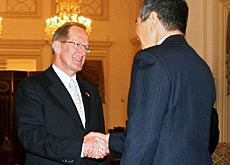Deiss aims to raise Swiss presence in Malaysia
The Swiss economics minister, Joseph Deiss, has begun an official visit to Malaysia aimed at strengthening bilateral relations and increasing the Swiss presence.
Deiss – who is accompanied by a business delegation on the four-day trip – visited Kuala Lumpur on Wednesday, where he held discussions with Najib Tun Razak, the vice president, and Jamaluddin Jarjis, the science and technology minister.
On the first day of the official visit, the two countries examined the state of bilateral relations and a possible trade agreement between the European Free Trade Association (EFTA) and Malaysia.
“Malaysia is an extremely innovative country and EFTA has stated on numerous occasions that it is interested in concluding a free trade accord,” Deiss told reporters.
Malaysia, southeast Asia’s third-largest economy, is one of Switzerland’s most important trade partners in the ASEAN (Association of Southeast Asian Nations) region.
Switzerland currently provides around SFr1.3 billion in annual foreign direct investment.
The delegation visited various Swiss companies in the Malaysian capital on Wednesday.
According to Seco, some 120 Swiss companies have set up in Malaysia, employing 20,000 workers. The largest include, ABB, Roche, Novartis, Holcim and Haco.
As part of the four-day trip, Deiss will also visit Penang, an island in the Straits of Malacca, and meet the Malaysian state’s chief minister and Rafidah Aziz, the trade and industry minister.
Challenges
Malaysian gross domestic product grew by 5.3 per cent in 2005, largely as a result of increasing private consumption.
Malaysia is Switzerland’s third-largest trading partner in southeast Asia – behind Singapore and Thailand – with a trade volume of almost SFr800 million ($650 million).
Swiss imports from Malaysia totalled SFr580 million, while Malaysian imports from Switzerland came to SFr210 million.
By contrast, Malaysia has $44 billion in two-way trade with the United States.
Deiss will be aiming to raise the Swiss presence in the country, but Malaysia’s government casts a big shadow over the economy, controlling or partly owning more than a third of the stock market. Its promise to conduct an orderly sell-down of state equity has so far led to very few sales of major stakes.
Malaysia limits foreign ownership to 30 per cent of local banks and 30 per cent of local insurers, though long-standing foreign owners can go to 51 per cent in the case of insurers.
Malaysia has tightly restricted foreign involvement. Opening it up would be a hot issue because an affirmative action policy uses state projects to redistribute wealth to its poorer ethnic Malay population, often preferring Malay contractors.
Winning Formula
Previous high-profile Swiss links with Malaysia include the Sauber Formula One team’s relationship with Petronas, Malaysia’s government-owned oil and gas company.
Petronas was one of the Swiss team’s main sponsors, supplying lubricants and fuel.
In June 2005 BMW acquired a majority stake in Sauber, and for the 2006 Formula One season Petronas is the exclusive partner of the BMW-Sauber team.
Petronas is also the main sponsor for Malaysian Grand Prix and co-sponsors the Chinese Grand Prix.
swissinfo with agencies
Malaysia has a per capita gross domestic product of $12,100 (SFr14,900), compared with $32,571 in Switzerland, according to the International Monetary Fund.
Malaysia is a federation of 13 states in southeast Asia and gained independence from Britain in 1957.
It consists of two regions, West Malaysia (or the Malaysian Peninsula) and East Malaysia, divided by the South China Sea.
More than half of Malaysia’s 26 million people are ethnic Malays, while 25% are Chinese and 10% Indians.
Malaysia has transformed itself since the 1970s from being heavily dependent on agricultural and mining activities into an emerging multi-sector economy.
Growth is almost exclusively driven by exports, particularly of electronics, although tourism also plays a role.
Healthy foreign exchange reserves, low inflation and a small external debt are all strengths that make it unlikely that Malaysia will experience a financial crisis in the near future.
In 2005 the Malaysian economy grew by 5.3% (compared with 7.1% in 2004).

In compliance with the JTI standards
More: SWI swissinfo.ch certified by the Journalism Trust Initiative

You can find an overview of ongoing debates with our journalists here . Please join us!
If you want to start a conversation about a topic raised in this article or want to report factual errors, email us at english@swissinfo.ch.